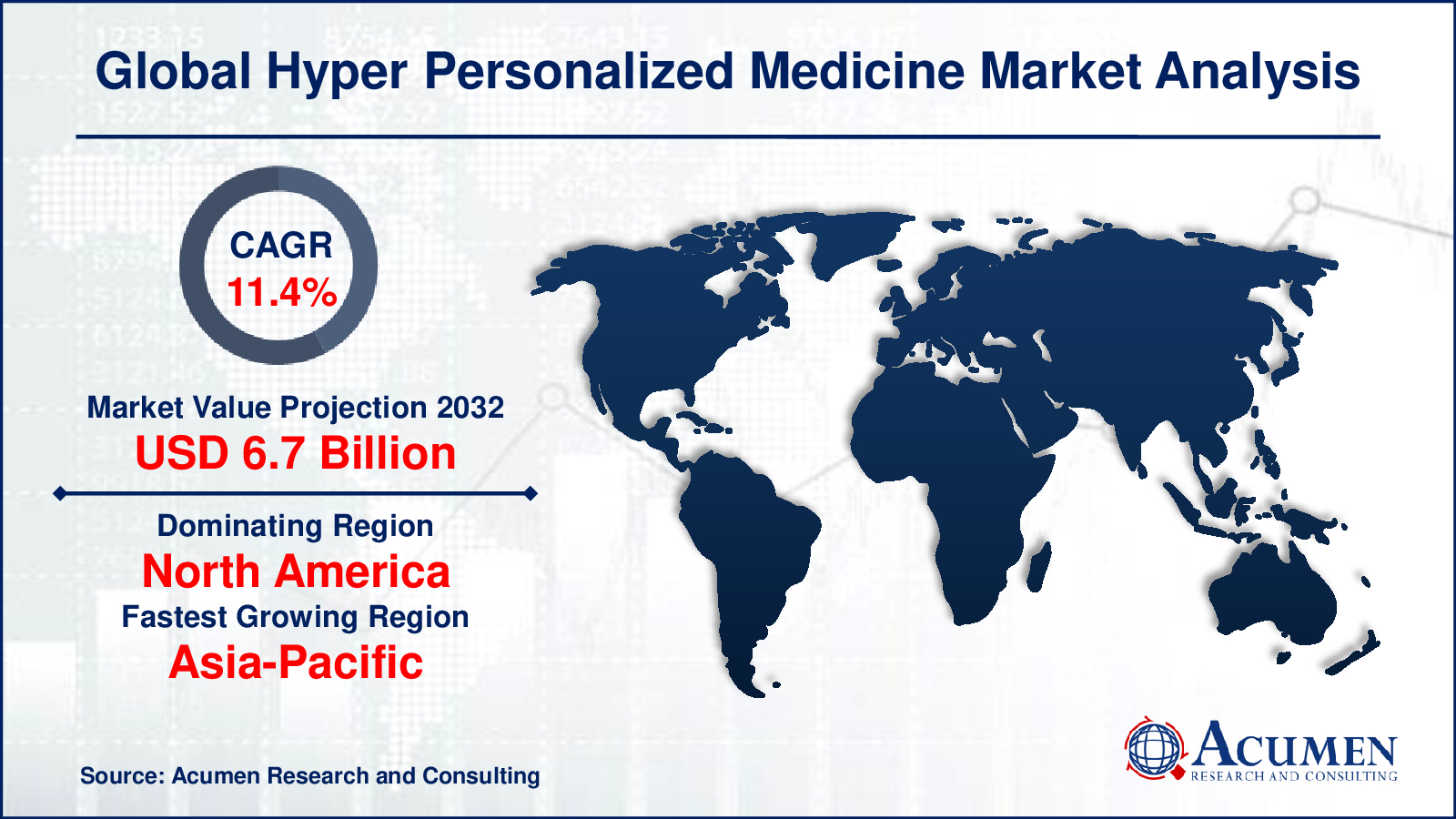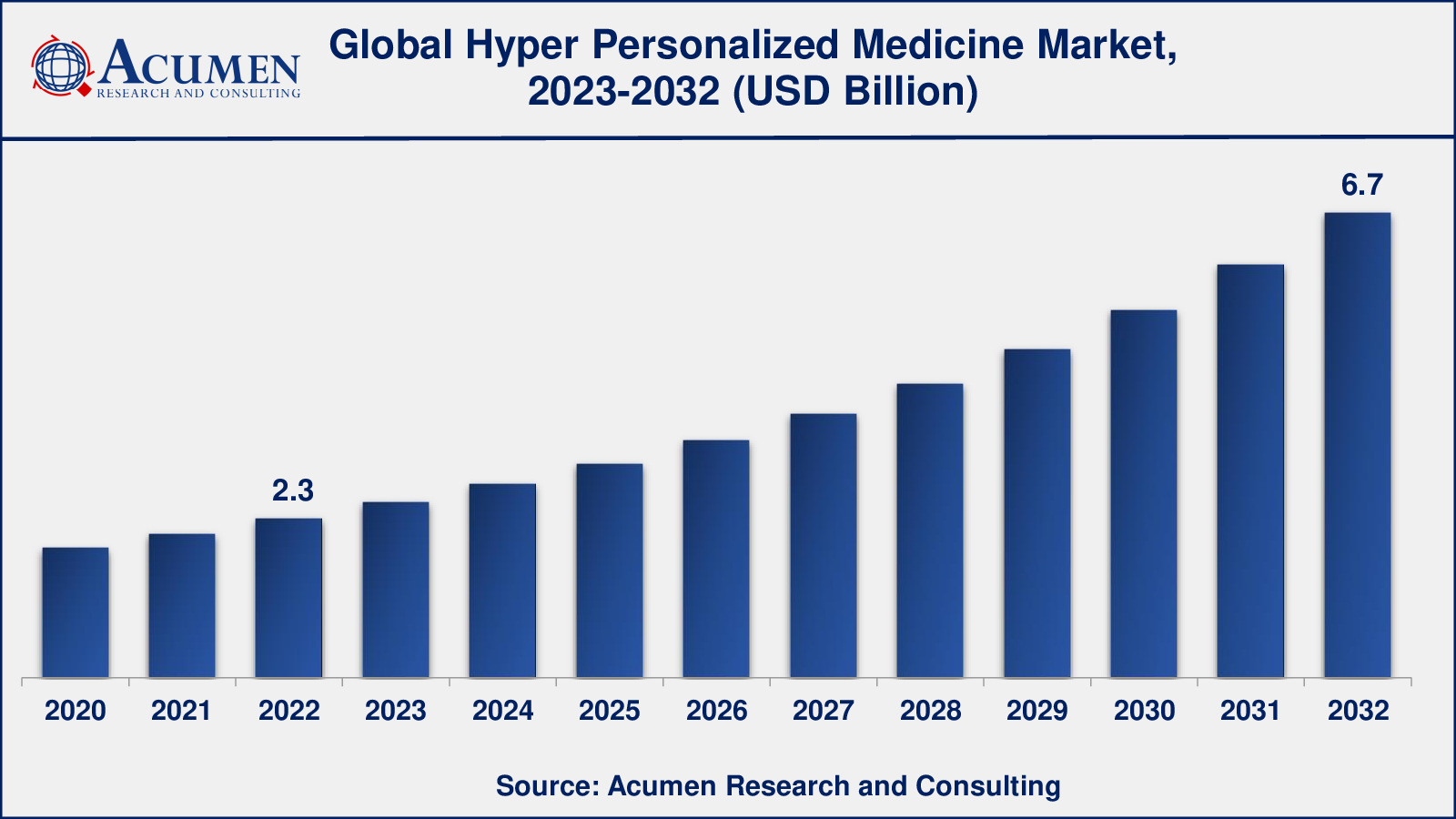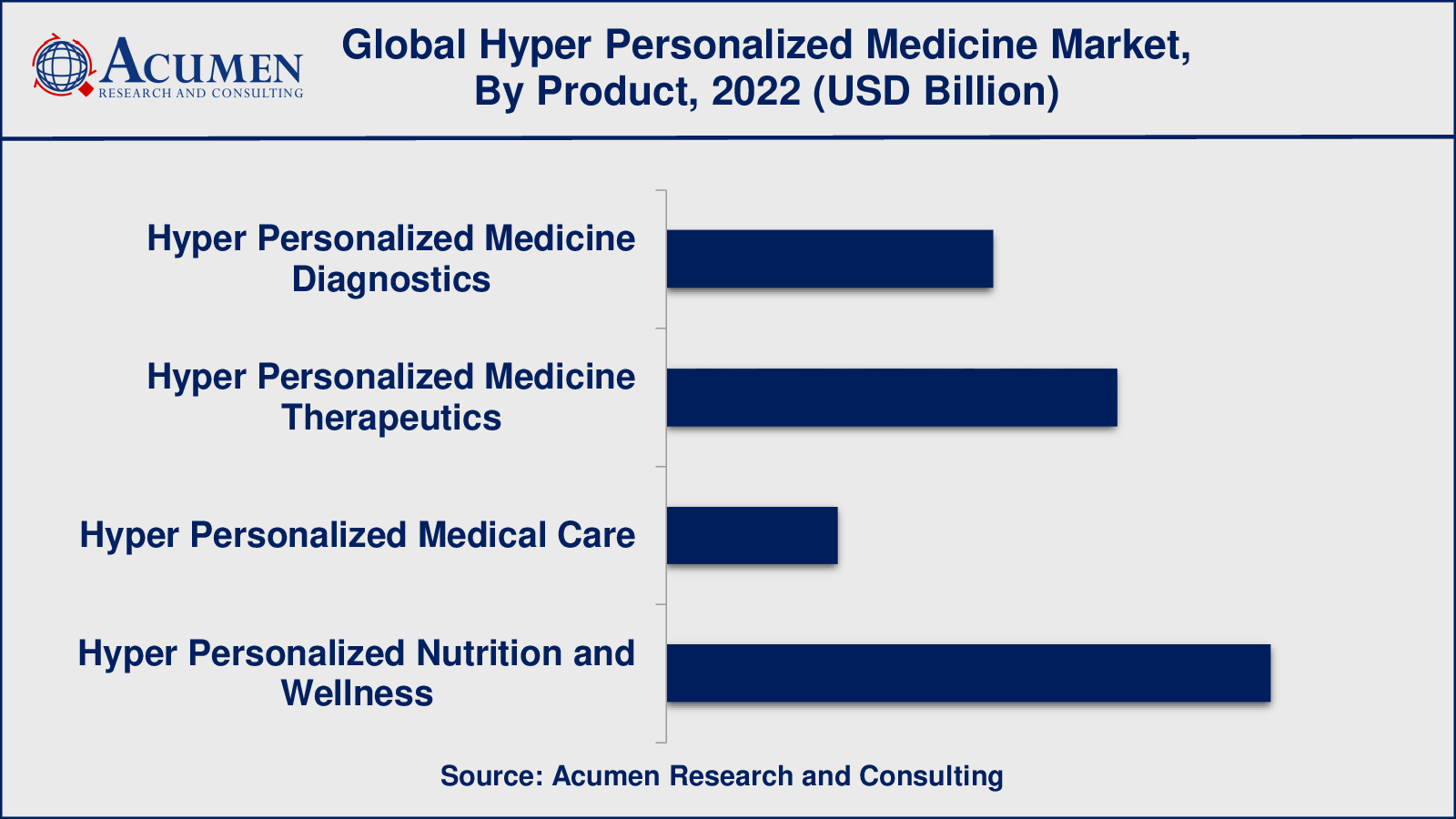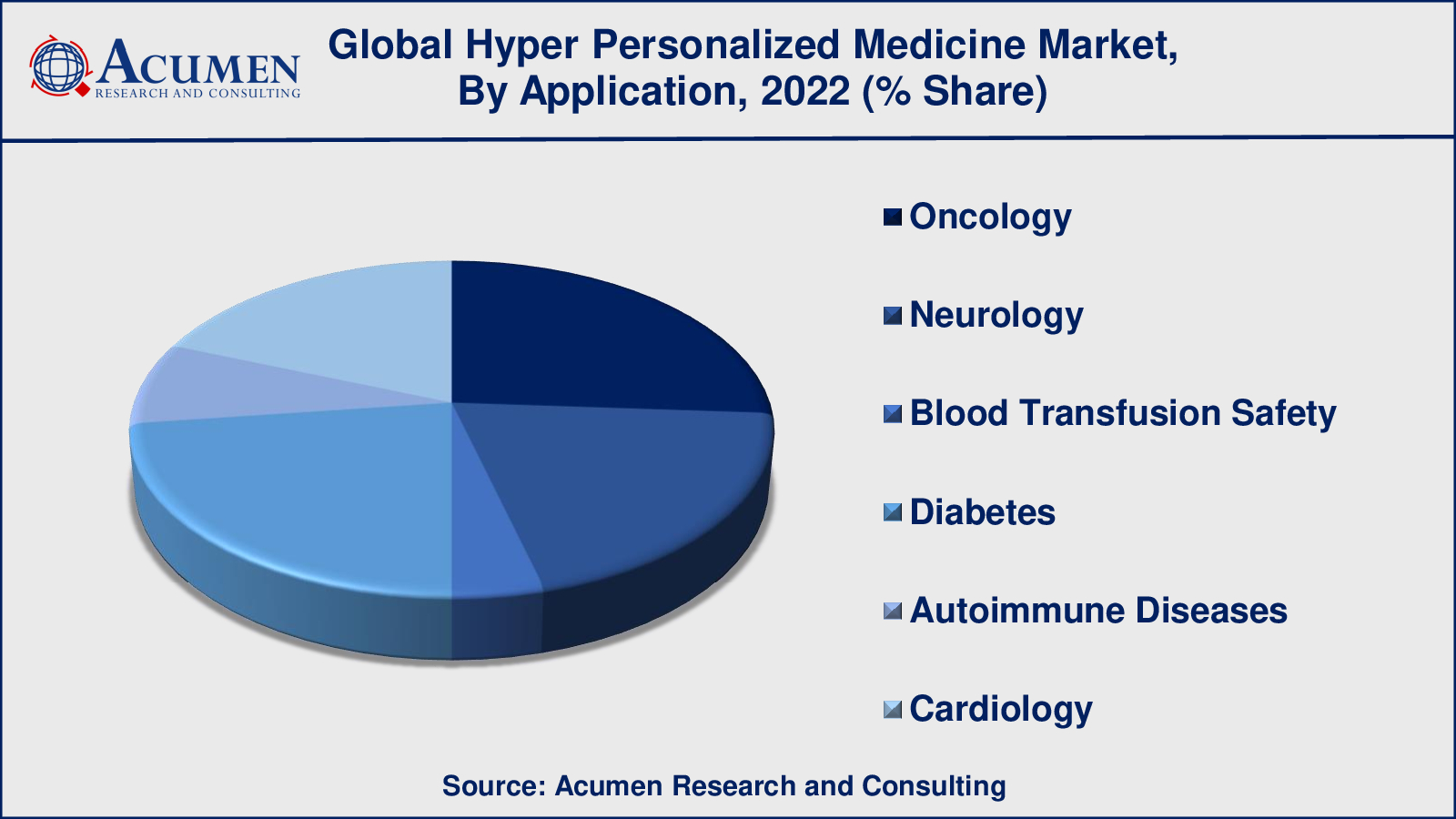Hyper Personalized Medicine Market Size - Global Industry, Share, Analysis, Trends and Forecast 2023 - 2032
Published :
Report ID:
Pages :
Format :
Hyper Personalized Medicine Market Size - Global Industry, Share, Analysis, Trends and Forecast 2023 - 2032
Report Coverage
- Industry Dynamics
- Market Size and Forecast Data
- Segment Analysis
- Competitive Landscape
- Regional Analysis with a Niche Focus on Country-Level Data
- High Level Analysis - Porter's, PESTEL, Value Chain, etc.
- Company Profiles of Key Players
- Option to Customize the Report As Per Your Specific Need
Request Sample Report
The Global Hyper Personalized Medicine market size was valued at USD 2.1 Trillion in 2022 and is projected to reach USD 6.7 Trillion by 2032 mounting at a CAGR of 11.4% from 2023 to 2032.
Hyper Personalized Medicine Market Highlights
- Global hyper personalized medicine market revenue is poised to garner USD 6.7 Trillion by 2032 with a CAGR of 11.4% from 2023 to 2032
- North America hyper personalized medicine market value occupied around USD 912 billion in 2022
- Asia-Pacific hyper personalized medicine market growth will record a CAGR of more than 12% from 2023 to 2032
- Among product, the hyper personalized medicine diagnostics sub-segment generated over US$ 889 billion revenue in 2022
- Based on application, the oncology sub-segment generated around 26% share in 2022
- Integration of wearable devices and mobile health technologies is a popular market trend that fuels the industry demand

Hyper personalized medicine is a cutting-edge approach to healthcare that focuses on personalizing medical treatments and interventions to individual patients based on genetic, molecular, and clinical features. It makes use of cutting-edge technology including as genomics, proteomics, and digital health to deliver highly personalized and targeted treatments.
This method is required since it recognizes that each patient is unique, both genetically and in terms of illness profile. Healthcare practitioners can design more accurate and successful treatment plans by knowing the unique genetic variants and molecular pathways behind a patient's ailment. This personalized strategy has the potential to enhance treatment results, decrease side effects, and improve overall patient care.
Hyper-personalized medicine is beneficial in a variety of ways. Primarily, by analyzing an individual's genetic information and biomarkers, it improves the accuracy and speed of illness detection. This allows for early diagnosis and intervention, which can boost treatment success rates dramatically. Second, it enables the creation of tailored medicines that target the molecular causes of a patient's condition. This focused strategy improves therapeutic efficacy while reducing the use of unneeded therapies or drugs.
Furthermore, hyper personalized medicine has the potential to alter chronic illness prevention and management. Individualized treatments can be done to prevent the start of disease or detect it at an early stage when therapies are most effective by identifying individuals who are at high risk of acquiring particular disorders.

Global Hyper Personalized Medicine Market Dynamics
Market Drivers
- Advancements in genomics and molecular diagnostics
- Increasing adoption of precision medicine approach
- Growing demand for personalized therapies and treatments
- Technological advancements in healthcare analytics and AI
- Rising prevalence of chronic diseases
Market Restraints
- High costs associated with personalized medicine
- Limited availability of infrastructure and expertise
- Ethical and privacy concerns related to genetic data
- Complex regulatory landscape for personalized medicine
- Challenges in integrating personalized medicine into standard healthcare practices
Market Opportunities
- Development of targeted therapies for rare diseases
- Expansion of personalized medicine in emerging markets
- Collaboration between pharmaceutical companies and diagnostic companies
- Potential for disease prevention and early intervention through personalized medicine
Hyper Personalized Medicine Market Report Coverage
| Market | Hyper Personalized Medicine Market |
| Hyper Personalized Medicine Market Size 2022 | USD 2.1 Trillion |
| Hyper Personalized Medicine Market Forecast 2032 | USD 6.7 Trillion |
| Hyper Personalized Medicine Market CAGR During 2023 - 2032 | 11.4% |
| Hyper Personalized Medicine Market Analysis Period | 2020 - 2032 |
| Hyper Personalized Medicine Market Base Year | 2022 |
| Hyper Personalized Medicine Market Forecast Data | 2023 - 2032 |
| Segments Covered | By Product, By Application, By End-User, and By Geography |
| Regional Scope | North America, Europe, Asia Pacific, Latin America, and Middle East & Africa |
| Key Companies Profiled | Global Laser Ltd, Honeywell International Inc., Kentek Corporation, Laser Safety Industries, NoIR Laser Company LLC, Phillips Safety Products, Inc., Thorlabs, Inc., Univet Optical Technologies, and VS Eyewear. |
| Report Coverage |
Market Trends, Drivers, Restraints, Competitive Analysis, Player Profiling, Covid-19 Analysis, Regulation Analysis |
Hyper Personalized Medicine Market Insights
Several variables impact the market dynamics of hyper personalized medicine, which drive its growth and acceptance. Advances in genomes and molecular diagnostics are one significant factor. The fast advancement of DNA sequencing technology, as well as the availability of large-scale genomic data, have allowed for a better understanding of the genetic variants linked to illnesses. This knowledge is at the heart of hyper personalized medicine, since it enables healthcare practitioners to discover particular genetic markers and design personalized treatment plans. Another key factor is the growing acceptance of the precision medicine approach. Individual reactions to therapy might vary greatly, thus traditional "one-size-fits-all" treatments have limits. Hyperpersonalized medicine recognizes the need for personalized interventions based on a person's unique features, resulting in more effective therapies and better patient outcomes. Patients, healthcare professionals, and pharmaceutical firms are becoming more aware of the potential benefits of personalized medicine, which is boosting demand for hyper personalized medicine.
The increased need for personalized cures and treatments is also influencing market dynamics. Patients want therapies that are tailored to their personal requirements, taking into consideration genetic predispositions, lifestyle variables, and illness features. hyper personalized medicine meets this desire by providing focused therapies that take these personalized features into account, resulting in more accurate and effective treatments. Technological breakthroughs in healthcare analytics and artificial intelligence (AI) play a vital influence in the hyper personalized medicine market dynamics. Artificial intelligence-powered algorithms and machine learning approaches can analyze massive volumes of patient data, detect trends, and offer actionable insights. This helps healthcare practitioners to make better educated treatment plan selections and optimize patient care.
However, there are certain constraints and limitations in the hyper personalized medicine market dynamics. The high expenses of personalized medicine, such as genetic testing and tailored medicines, may limit its broad use. Furthermore, the scarcity of infrastructure and knowledge needed to execute personalized medicine techniques can be a difficulty, particularly in less developed healthcare systems.
Another key aspect is ethical and privacy concerns around the usage of genetic data. The collecting, storage, and analysis of genetic data raise privacy concerns and necessitate stringent data protection safeguards. Ensuring patient permission, ensuring data security, and resolving genetic discrimination issues are all crucial for the effective implementation of hyper personalized medicine. Furthermore, the complicated regulatory environment for personalized medicine poses difficulties. Developing and commercializing personalized medicines frequently necessitates negotiating several regulatory systems, such as diagnostic, targeted therapy, and companion diagnostic authorization processes. Streamlining rules and encouraging collaboration among regulatory authorities, pharmaceutical firms, and diagnostic businesses will help hyper personalized medicine thrive.
Hyper Personalized Medicine Market Segmentation
The worldwide market for hyper personalized medicine is split based on product, application, end-user, and geography.
Hyper Personalized Medicine Products
- Hyper Personalized Medicine Diagnostics
- Hyper Personalized Medicine Therapeutics
- Hyper Personalized Medical Care
- Hyper Personalized Nutrition and Wellness

According to hyper personalised medical industry research, the hyper personalised nutrition category will have the largest market share in 2022. The goal of hyper personalised nutrition and wellness is to personalise nutrition regimens, dietary recommendations, and lifestyle interventions to an individual's genetic and metabolic features. This industry frequently uses genetic testing and analysis to give personalised dietary advice and wellness programmes.
Genetic testing, molecular profiling, and biomarker analysis are used in highly personalised medical diagnostics to detect individual disease risks, offer accurate diagnoses, and lead personalised treatment options. Companies like Illumina, Qiagen, and Abbott have made significant contributions to the field of diagnostics for personalised medicine.
Therapeutics in hyperpersonalized medicine are focused on creating targeted therapeutics customised to individual patients based on their genetic and molecular profiles. Precision oncology treatments, pharmacogenomics-guided medication selection, and gene therapies are examples of this. Companies such as Novartis, Pfizer, and Roche have made considerable strides in personalised treatments.
Individualised treatment regimens, personalised illness management techniques, and patient-centered care models are all part of hyper personalised medical care. It entails combining patient-specific data, such as genetic data, electronic health records, and wearable sensor data, in order to provide personalised healthcare services. This industry includes a diverse spectrum of healthcare providers, hospitals, and specialised clinics that provide individualised treatment.
Hyper Personalized Medicine Applications
- Oncology
- Neurology
- Blood Transfusion Safety
- Diabetes
- Autoimmune Diseases
- Cardiology

The goal of highly personalised medicine has been to produce tailored treatments and treatment strategies based on a patient's genetic and molecular profile. Precision oncology, which entails detecting precise genetic changes in tumours and tailoring medicines appropriately, has showed promise in improving cancer treatment results. Several corporations and research institutes have been actively involved in the advancement of personalised cancer methods.
Another area where highly personalised treatment has gained traction is neurology. Understanding an individual's genetic and molecular composition can aid in early diagnosis, disease monitoring, and the development of personalised treatment options for illnesses such as Alzheimer's, Parkinson's, and multiple sclerosis. The use of genomics and molecular profiling into neurology has the potential to revolutionise patient treatment.
Blood transfusion safety is an important application in which hyper personalised medicine may help. Personalised blood transfusion tactics can be developed utilising modern molecular technology and genetic testing to assure compatibility and minimise adverse responses. This emphasis on personalised blood transfusion safety has the potential to improve patient outcomes and decrease complications.
Furthermore, personalised methods to diabetes care are gaining ground. Understanding an individual's genetic susceptibility, metabolic profile, and reaction to drugs might assist in the development of personalised treatment regimens and lifestyle interventions as the global prevalence of diabetes rises.
Hyper Personalized Medicine End-Users
- Hospitals
- Diagnostic Centers
- Research and Academic Institutes
- Others
As per the hyper personalized medicine market foreast, hospitals sub-segment are expected to gather significant share from 2023 to 2032. The hospitals are well-positioned to adopt and implement hyper personalized medicine approaches due to their comprehensive infrastructure, healthcare expertise, and direct patient care capabilities. They may include genetic testing, molecular profiling, and other personalised medicine technologies into their current healthcare operations.
Diagnostic centres are very important in the implementation of hyper personalised medicine. These diagnostic testing centres specialise in diagnostic testing and provide a variety of services such as genetic testing, biomarker analysis, and molecular diagnostics. They collaborate closely with healthcare providers, such as hospitals and clinics, to deliver reliable and rapid diagnostic data to drive personalised treatment decisions.
The growth and improvement of hyper personalised medicine is aided by research and academic establishments. These organisations carry out research, clinical trials, and studies to investigate novel biomarkers, genetic links, and treatment methods. To transform research results into practical applications, they frequently cooperate with industrial partners and healthcare providers.
Specialised clinics, precision medicine firms, pharmaceutical corporations, and telemedicine providers are examples of other end-users. Specialised clinics may specialise in a single condition or offer broad personalised medical treatments. Companies that specialise in precision medicine create and sell genetic testing kits, molecular diagnostic systems, and data analytics solutions. Pharmaceutical firms may invest in personalised medicine research and the development of targeted treatments. Telemedicine companies can assist individuals seeking personalised treatment with remote consultations and genetic counselling.
Hyper Personalized Medicine Market Regional Outlook
North America
- U.S.
- Canada
Europe
- U.K.
- Germany
- France
- Spain
- Rest of Europe
Asia-Pacific
- India
- Japan
- China
- Australia
- South Korea
- Rest of Asia-Pacific
Latin America
- Brazil
- Mexico
- Rest of LATAM
The Middle East & Africa
- South Africa
- GCC Countries
- Rest of the Middle East & Africa (ME&A)
Hyper Personalized Medicine Market Regional Analysis
North America, particularly the United States, has been a significant market for hyper personalized medicine. The region has seen substantial research and development in genomics, molecular diagnostics, and personalized medicines. A well-established healthcare infrastructure, favorable reimbursement rules, and high healthcare expenditure all contribute to the region's market growth.
Europe has also been a leader in the adoption of hyper personalized medicine techniques. Personalized medicine efforts, research collaborations, and infrastructure development have made significant progress in countries such as the United Kingdom, Germany, and France. The existence of famous academic and research institutions, as well as favorable regulatory frameworks, has aided industry expansion in Europe.
The Asia Pacific region is witnessing a growing interest in hyper personalized medicine. Countries like China, Japan, and South Korea are investing in genomic research, molecular diagnostics, and precision medicine initiatives. The region's large population, increasing healthcare expenditure, and rising awareness about personalized healthcare contribute to the market's growth potential. However, challenges such as the need for infrastructure development and regulatory frameworks tailored to personalized medicine remain.
Hyper Personalized Medicine Market Players
Some of the top Hyper Personalized Medicine companies offered in our report include Global Laser Ltd, Honeywell International Inc., Kentek Corporation, Laser Safety Industries, NoIR Laser Company LLC, Phillips Safety Products, Inc., Thorlabs, Inc., Univet Optical Technologies, and VS Eyewear.
Hyper Personalized Medicine Industry Recent Developments
- In September 2021, Abbott received CE Mark approval for its Panbio™ COVID-19 Ag Rapid Test Device for at-home use. The test allows individuals to self-administer the antigen test and obtain results within 15 minutes, aiding in the rapid detection of COVID-19 infections.
- In November 2021, Illumina announced the acquisition of GRAIL, a healthcare company focused on multi-cancer early detection. This strategic acquisition expands Illumina's portfolio in the field of cancer screening and reinforces its commitment to advancing precision medicine.
Frequently Asked Questions
What was the market size of the global Hyper Personalized Medicine in 2022?
The market size of hyper personalized medicine was USD 2.1 Trillion in 2022.
What is the CAGR of the global Hyper Personalized Medicine market from 2023 to 2032?
The CAGR of hyper personalized medicine is 11.4% during the analysis period of 2023 to 2032.
Which are the key players in the Hyper Personalized Medicine market?
Which are the key players in the Hyper Personalized Medicine market?
Which region dominated the global Hyper Personalized Medicine market share?
North America held the dominating position in hyper personalized medicine industry during the analysis period of 2023 to 2032.
Which region registered fastest CAGR from 2023 to 2032?
Asia-Pacific region exhibited fastest growing CAGR for market of hyper personalized medicine during the analysis period of 2023 to 2032.
What are the current trends and dynamics in the global Hyper Personalized Medicine industry?
The current trends and dynamics in the hyper personalized medicine industry include increasing adoption of precision medicine approach, growing demand for personalized therapies and treatments, and technological advancements in healthcare analytics and AI
Which Product held the maximum share in 2022?
The hyper personalized nutrition and wellness held the maximum share of the hyper personalized medicine industry.




